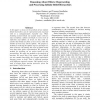Free Online Productivity Tools
i2Speak
i2Symbol
i2OCR
iTex2Img
iWeb2Print
iWeb2Shot
i2Type
iPdf2Split
iPdf2Merge
i2Bopomofo
i2Arabic
i2Style
i2Image
i2PDF
iLatex2Rtf
Sci2ools
109
click to vote
ICMAS
2000
2000
Reasoning About Others: Representing and Processing Infinite Belief Hierarchies
In this paper we focus on the problem of how infinite belief hierarchies can be represented and reasoned with in a computationally tractable way. When modeling nested beliefs one usually deals with two types of infinity: infinity of beliefs on every level of reflection and infinity of levels. In this work we assume that beliefs are finite at every level, while the number of levels may still be infinite. We propose a method for reducing the infinite regress of beliefs to a finite structure. We identify the class of infinite belief trees that allow finite representation. We propose a method for deciding on an action based on this presentation. We apply the method to the analysis of auctions. We prove that if the agents' prior beliefs are not common knowledge, the revenue equivalence theorem ceases to hold. That is, different auctions yield different expected revenue. Our method can be used to design better auction protocols, given the participants' belief structures.
Related Content
| Added | 01 Nov 2010 |
| Updated | 01 Nov 2010 |
| Type | Conference |
| Year | 2000 |
| Where | ICMAS |
| Authors | Sviatoslav Brainov, Tuomas Sandholm |
Comments (0)

